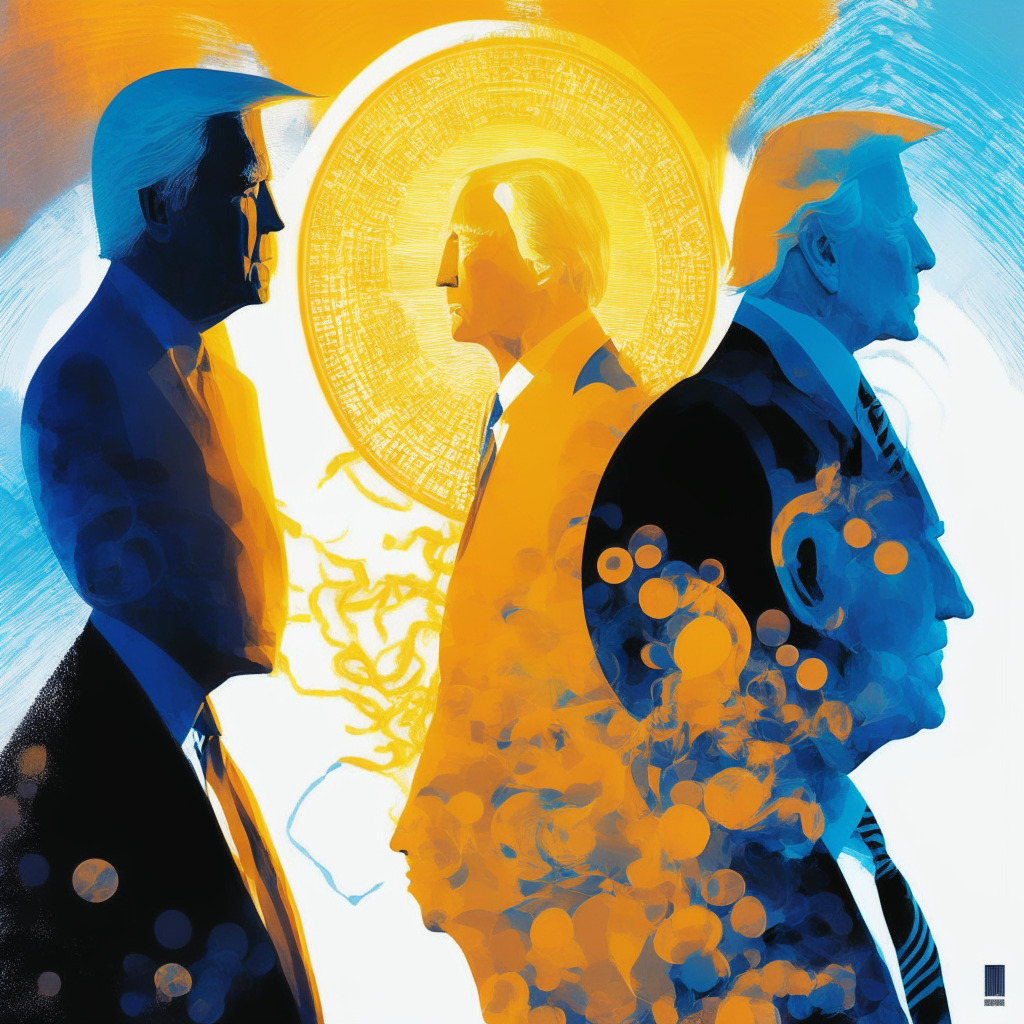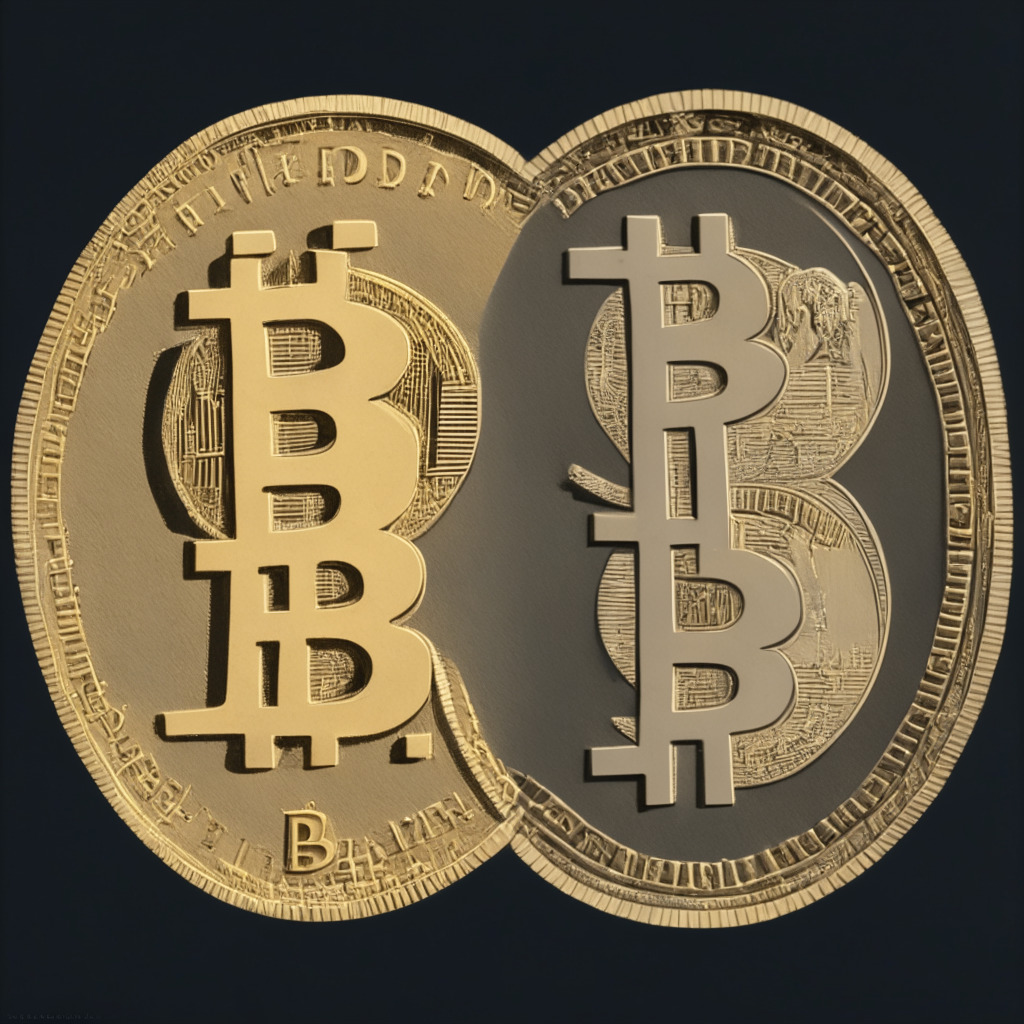“The Ethereum ETFs’ approval by the U.S. Securities and Exchange Commission symbolizes a crucial regulatory progression, and, despite low initial trading volumes, it opens the door for crypto market expansion. However, investor preferences and wavering organizational confidence could influence the ETFs’ success trajectory.”
Search Results for: U.S. Securities Exchange Commission
Bitcoin’s Bullish Outlook: Institutional Interest and Decreasing Availability on Exchanges
“Bitcoin’s 3% rise past the $27,300 mark is attributed to the plunging supply of Bitcoin on exchanges. This dwindling supply signals traders’ confidence in Bitcoin’s potential for long-term holding, while institutional interest continues to grow. However, the market remains predominantly fearful according to the Fear & Greed Index.”
FTX Pioneer Sam Bankman-Fried’s Legal Struggles: Is the U.S. Government Too Stringent on Crypto Leaders?
FTX founder, Sam Bankman-Fried, faces opposition from U.S. authorities for temporary release from jail prior to his trial. Accused with fraud-related charges during his tenure at FTX and Alameda Research, he pleads innocent. This situation casts a shadow over the future of crypto technology.
The Lure and Perils of Imminent Ethereum Futures ETFs Launch Amid U.S. Shutdown Fears
Bloomberg analysts predict the launch of Ethereum futures exchange-traded funds (ETFs) in the US, possibly accelerated by a potential government shutdown. The SEC might permit various Ethereum futures ETFs to launch next week. Despite previous failed attempts, analysts give a 90% chance of launching this October, but regulatory complexities and uncertainties remain a concern in the crypto market.
Bipartisan Battle for Crypto: A Deep Dive into U.S. Digital Asset Regulation
Senators Kirsten Gillibrand and Cynthia Lummis have introduced a new crypto bill, the Responsible Financial Innovation Act, aimed at addressing regulatory ambiguity in the US cryptocurrency industry. This legislation could shift the oversight of most digital assets from SEC to the Commodity Futures Trading Commission.
JPEX Exchange Halts Operations: A Setback or a Gateway to Decentralized Future?
The Hong Kong cryptocurrency exchange, JPEX, has temporarily ceased operations due to a legal probe by the Securities and Futures Commission, resulting in the arrest of a key person. JPEX, operating without a local license, has faced user grievances and is also undergoing friction in Taiwan with affiliated influencers.
Regulatory Gauntlet: Crypto’s Confrontation with Dated Securities Laws
“Crypto’s audacious defiance of conventional regulatory frameworks is drawing widespread regulatory attention. Enforcement activities now target leading crypto entities, leveraging laws up to 90 years old. As scrutiny increases, the key question is what will crumble first – our dated securities laws or the crypto industry itself?”
Navigating Rough Waters: Crypto Exchanges and Market Liquidity Amidst Regulatory Pressure
“The world of cryptocurrency is experiencing significant change amidst SEC scrutiny and exchange turbulence. Key developments include the unexpected departure of Binance.US’s CEO, BitMEX’s introduction of a prediction market, and concerns around FTX’s proposed changes in crypto assets.”
U.S. Regulatory Hurdles: Driving Crypto Startups Towards Friendlier Shores?
“Ripple’s CEO, Brad Garlinghouse, argues that the U.S. is the worst country for crypto start-ups due to its hesitance towards digital asset innovation. He highlights the UK, Singapore, UAE, and Switzerland as nations nurturing such innovation. Aggressive lawsuits by SEC and CFTC complicate the implementation of crypto regulations in the U.S., possibly inducing a mass exodus of blockchain startups to friendlier jurisdictions.”
Clash of Titans: SEC’s Gensler’s Crypto Apprehensions and the Ongoing Crypto-securities Law Drama
U.S. Securities and Exchange Commission Chair, Gary Gensler, stands firm on his belief that most crypto tokens likely qualify as investment contracts under the law, making them subject to securities laws. Despite recent court decisions favoring crypto entities like Ripple, Gensler remains focussed on the noncompliance of the crypto sector with these laws, fuelling ongoing crypto-securities law conflicts.
Groundbreaking: U.S. Poised for First Spot Ether ETFs – A Game Changer or A Risk Too Far?
“Cboe’s BZX exchange is preparing for a historical first with the potential launch of the U.S.’s maiden spot ether exchange-traded funds (ETFs). The SEC’s approval of such a move would mark a new era of crypto trading, including on-the-spot ether exchanges via ETFs. The decision may reshape the financial landscape, creating a new entry point for traditional investors into the realm of digital currency.”
Ripple Effects of Grayscale’s Court Win: Impact on Cryptocurrency Market & U.S. Spot Bitcoin ETF Future
Grayscale’s recent legal victory against the U.S. Securities and Exchange Commission may potentially transform the company into the first-ever U.S. spot Bitcoin ETF. This development could make Alameda Research’s lawsuit against Grayscale, urging for lower fees and a redemption program, unwarranted. However, the lawsuit has brought the debate on fee structures and redemption policies into the spotlight, which could ultimately shape the future of blockchainization.
The Great Debate: U.S. Crypto Development Hiatus or Reinvention?
Antonio Juliano, founder of dYdX, suggests a hiatus for US-focused crypto development due to the austere regulatory framework. He encourages startups to explore non-US markets for less regulatory ambiguity and swifter growth. However, the CEO of Coinbase, Brian Armstrong, is confident in US adaptability, contradicting Juliano’s decade-long pause suggestion.
Navigating U.S. Crypto Regulations: Retreat or Stand Ground for Long-Term Survival?
Antonio Juliano, founder of dYdX, suggests crypto developers should shift their focus from the convoluted U.S. regulatory environment to friendlier overseas markets for the next five to ten years. His perspective sheds light on the industry perception that U.S. lacks definitive digital asset regulations. However, views differ, with some believing that despite current regulatory obscurity, pioneers can seek clarity and establish a safe, legal operating ground in the U.S.
Regulatory Compliance and Crypto Exchange: Binance, Checkout.com, and the Premature Contract Termination
“Binance, the world’s largest cryptocurrency exchange, faced contract termination from payment processing giant Checkout.com due to regulatory concerns. Checkout had facilitated billions in crypto transactions for Binance. This termination underscores the impact of regulatory scrutiny on even the most lucrative partnerships within the crypto industry.”
SEC Appeals XRP Verdict: Impact on Crypto Asset Laws and Future of Securities Law
The U.S. SEC has filed a motion to appeal a verdict stating that XRP sales through exchanges do not infringe securities law. The SEC’s argument focuses on the legitimacy of “investment contracts” issuing crypto assets, the outcome of which could influence other lawsuits and military matters.
Coinbase Achives Unprecedented U.S. Regulatory Milestone: Boom or Bust for Crypto Industry?
The U.S. Commodity Futures Trading Commission (CFTC) has granted Coinbase unprecedented authority to handle bitcoin and ether futures, marking it as the first crypto company to receive registration as a futures commission merchant. This significant development indicates robust systems for capital, disclosures, record-keeping, and customer fund segregation, and it might influence how ether and similar commodities navigate the U.S. regulatory regime. However, concerns arise about potential market manipulation and the impact on other crypto-native companies.
Cryptocurrency Exchange Coin Launches Base Blockchain: A Game Changer or A Risk?
U.S. cryptocurrency exchange, COIN, has launched Base blockchain, a “layer 2 network” constructed on the Ethereum blockchain, potentially becoming a new revenue stream. Meanwhile, Rep. Maxine Waters expressed concerns about PayPal creating its own stablecoin without adequate federal laws. Futures activity indicates a stop to the Federal Reserve’s rate hikes due to the looming CPI release.
U.S. Justice Department vs Binance: Predicting Ripple Effects on Bitcoin Prices in the Face of Scandal
“The U.S. Department of Justice is considering fraud charges against Binance, potentially impacting the crypto market. Regardless of the outcome, experts suggest the market, due to its resilience and increasing utility, could weather the storm. However, possible Binance asset drain could trigger a market crash, while the outcome could affect Bitcoin’s value trajectory by year-end.”
Navigating Crypto Future: CoinGecko’s New Category for SEC-Recognized Securities
CoinGecko, a leading cryptocurrency data aggregator, has introduced a “Top Alleged Securities Coins” category featuring crypto assets classified as securities by the U.S. Securities and Exchange Commission (SEC). The section, which includes coins like Binance Coin, Cardano, and Solana, helps users navigate the complex regulatory environment surrounding digital assets.
2024 U.S. Presidency & Crypto: Favouring Central Bank Digital Currencies or Upholding Bitcoin?
“According to Grayscale, presidential candidates Joe Biden and Donald Trump might support the development of central bank digital currency (CBDC), despite their unclear stance on Bitcoin. Other candidates have expressed both support for cryptocurrencies and opposition to CBDCs. Amidst this, regulatory uncertainty tests the resilience of crypto firms and generates various views about the future of cryptocurrencies.”
Coinbase CEO’s Firm Stand on Staying in U.S. Despite Regulatory Hurdles: A Brave New Path?
“Coinbase CEO, Brian Armstrong, recently dispelled rumors of the crypto exchange planning a move from the U.S. amid regulatory challenges. Armstrong affirmed the company’s commitment to navigate the U.S. regulatory environment, highlighting the need for pioneers and regulators to work together for technological growth and consumer protection.”
Impending U.S. DoJ Action against Binance: The Possible Catalyst for a Crypto Market Meltdown
The US Department of Justice (DoJ) reportedly deliberates on fraud charges against Binance, one of the world’s largest crypto exchanges. A potential indictment could cause an exodus from Binance, triggering losses and a broader market panic. Authorities are considering fines and deferred prosecution agreements to minimize consumer harm. Binance prepares for potential fallouts by securing assets and maintaining a healthy ratio for mass withdrawals. The incident highlights complexities in the world of cryptocurrencies, with watchful scrutiny on the looming regulatory battle.
Binance’s Potential U.S. Exit: A Catalyst for Crypto Regulatory Clarity?
“Binance, the crypto exchange platform, is considering shutting its US operations amid intensified regulatory scrutiny and allegations of operating as an unregistered securities exchange. This decision is potentially significant for future crypto adoption, regulatory compliance, and the ongoing institutionalization of cryptocurrencies.”
U.S. Crypto Regulation: Balancing Innovation and Compliance in the Blockchain Era
“The U.S Congress moved closer to regulatory clarity with two crypto-related bills: the Financial Innovation and Technology for the 21st Century Act, aimed at crypto company registrations, and the Blockchain Regulatory Certainty Act, aiming to cut down barriers for blockchain developers. However, potential conflicts between lawmakers and industry operators may lead to strenuous compliance requirements, possibly bringing the crypto industry closer to traditional finance rules and limitations.”
Binance vs CFTC: A Clash Highlighting Jurisdictional Discrepancies in Cryptocurrency Exchanges
Binance, a prominent crypto exchange, challenges the U.S. Commodity Futures Trading Commission’s jurisdiction over a non-U.S. platform, arguing the charges lack statutory support. The key issue: whether Binance falls under regulatory compliance provisions of the Commodity Exchange Act when offering additional products. Despite legal complications, Binance continues to resist alleged infractions.
Sweeping U.S. Regulatory Acts: Crypto Advancement or Investor Risk?
The House Financial Services Committee approves a bipartisan bill, Financial Innovation and Technology for the 21st Century Act, aiming to provide regulatory clarity for cryptocurrencies. The Act delineates registration requirements for crypto firms and seeks to define if a cryptocurrency is a security or a commodity, extending the CFTC’s control over the crypto industry.
Binance’s Audacious Stand Against U.S. CFTC: A Game-Changer for Crypto Regulations
“Cryptocurrency exchange, Binance, plans to challenge the U.S. Commodity Futures Trading Commission’s lawsuit against it over alleged illegal activities. This audacious move may change the landscape of cryptocurrency regulation within the U.S., setting precedent for future cases and influencing the future of cryptocurrency market.”
Navigating the Pros and Cons of the U.S. House Republicans’ New Crypto Oversight Bill
“The Financial Innovation and Technology for the 21st Century Act by U.S. House Republicans aims to provide a sound regulatory framework for crypto investors protection. The bill seeks to establish clear regulatory principles balancing progressive tech with protective legislation, which, if successful, may streamline the fragmented regulation landscape in the U.S. and serve as a global blueprint.”
Roadmap to Regulations: Unveiling the U.S. Senators’ Bill for Comprehensive Crypto Laws
U.S. Senators Cynthia Lummis and Kirsten Gillibrand unveiled a revised draft for comprehensive crypto regulation, marking an evolution from a previous draft penned a year ago. The bill addresses decentralized finance definition, anti-money laundering provisions, custody rules and grants the CFTC decisive control over crypto issuers, alongside defining roles for the SEC.
Regulatory Body vs Coinbase: The Future Precedence of Staking Services as Securities
“Cryptocurrency exchange Coinbase has temporarily paused staking of assets in response to legal procedures from local regulators. This follows a lawsuit accusing Coinbase of offering unregistered securities, leading to regulatory action in states. Despite disagreements, Coinbase is choosing to comply until fully defending itself.”
U.S. Spot Bitcoin ETF: Regulatory Milestone or Investor Attraction Dampener?
“The U.S. SEC’s potential approval of a spot bitcoin ETF may not significantly influence crypto markets, according to investment banking giant JPMorgan. Their report suggests the lack of interest in similar ETFs in Europe and Canada implies that even though a spot bitcoin ETF offers a streamlined, secure cryptocurrency investment method, it fails to attract widespread investor attention.”































